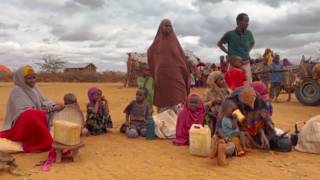
By Amy Goodman with Denis Moynihan
The United Nations’ annual climate summit descended on Durban, South Africa, this week, but not in time to prevent the tragic death of Qodeni Ximba. The 17-year-old was one of 10 people killed in Durban on Sunday, the night before the U.N. conference opened. Torrential rains pummeled the seaside city of 3.5 million. Seven hundred homes were destroyed by the floods.
Ximba was sleeping when the concrete wall next to her collapsed. One woman tried to save a flailing 1-year-old baby whose parents had been crushed by their home. She failed, and the baby died along with both parents. All this, as more than 20,000 politicians, bureaucrats, journalists, scientists and activists made their way to what may be the last chance for the Kyoto Protocol.
How might the conference have prevented the deaths? A better question is, how might the massive deluge, which fell on the heels of other deadly storms this month, be linked to human-induced climate change, and what is the gathering in Durban doing about it? Durban has received twice the normal amount of rain for November. The trends suggest that extreme weather is going to get worse.
The Intergovernmental Panel on Climate Change is a group with thousands of scientists who volunteer their time “to provide the world with a clear scientific view on the current state of knowledge in climate change.” The group won the Nobel Peace Prize in 2007. Last week, the IPCC released a summary of its findings, clearly linking changing climate to extreme weather events such as drought, flash floods, hurricanes, heat waves and rising sea levels. The World Meteorological Organization released a summary of its latest findings, noting, to date, that 2011 is the 10th-warmest year on record, that the Arctic sea ice is at its all-time low volume this year, and that 13 of the warmest years on record have occurred in the past 15 years.
Which brings us to Durban. This is the 17th Conference of the Parties to the United Nations Framework Convention on Climate Change, or, simply, COP17. One of the signal achievements of the U.N. process to date is the Kyoto Protocol, an international treaty with enforceable provisions designed to limit greenhouse-gas emissions. In 1997, when Kyoto was adopted, China was considered a poor, developing country, and, as such, had far fewer obligations under Kyoto. Now, the U.S. and others say that China must join the wealthy, developed nations and comply with that set of rules. China refuses. That is one of the major, but by no means the only, stumbling blocks to renewing the Kyoto Protocol (another major problem is that the world’s historically largest polluter, the United States, signed Kyoto but did not ratify it in Congress).
In Copenhagen in late 2009 (at COP15), President Barack Obama swept in, organized back-door, invite-only meetings and crafted a voluntary—i.e., unenforceable—alternative to Kyoto, angering many. COP16 in Cancun, Mexico, in 2010 heightened the distance from the Kyoto Protocol. The prevailing wisdom in Durban is that this is make-or-break time for the U.N climate process.
Exacerbating Obama’s failures is the Republican majority in the House of Representatives that largely holds human-made climate change as being either a hoax or simply nonexistent, as do eight of nine Republican presidential candidates. Oil and gas corporations spend tens of millions of dollars annually to promote junk science and climate-change deniers. Their investment has paid off, with an increasing percentage of Americans believing that climate change is not a problem.
Coincident with the disappointing U.N. proceedings has been a growing movement for climate justice in the streets. Protests against fossil-fuel dependence, which accelerates global warming, range from the nonviolent direct action against mountaintop-removal coal mining in West Virginia to the arrest of more than 1,200 people at the White House opposing the Keystone XL tar sands oil pipeline.
Which is why Durban, South Africa, is such a fitting place for civil society to challenge the United Nations process. The continent of Africa is projected to experience the impact of climate change more severely than many other locales, and most populations here are less well-equipped to deal with climate disasters, without proper infrastructure or a reserve of wealth to deploy. Yet these are the people who threw off the oppressive yoke of apartheid.
South African novelist Alan Paton wrote of apartheid in 1948, the system’s first year, anticipating a long fight to overturn it, “Cry, the beloved country, these things are not yet at an end.” The same determination is growing in the streets of Durban, providing the leadership so lacking in the guarded, air-conditioned enclave of COP17.
Amy Goodman is the host of “Democracy Now!,” a daily international TV/radio news hour airing on more than 950 stations in North America. She is the author of “Breaking the Sound Barrier,” recently released in paperback and now a New York Times best-seller.
© 2011 Amy Goodman











Media Options